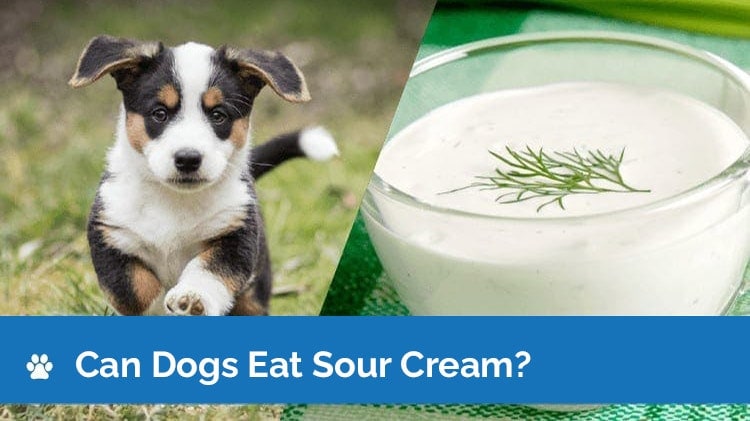Can Dogs Eat Sour Cream?
Dogs can eat sour cream in small quantities. However, it is high in fat and may cause digestive issues if fed too much. Dogs with pancreatitis or other digestive disorders should avoid sour cream. In moderation, sour cream can be a healthy addition to your dog’s diet.
Sour cream is a good source of protein and calcium, and it also contains beneficial probiotics. Probiotics are live microorganisms that help keep the gut healthy by maintaining the balance of good and bad bacteria.
Of course, you should always check with your veterinarian before making any changes to your dog’s diet. And be sure to offer only plain, unsweetened sour cream as a treat – avoid any products that contain artificial sweeteners or other additives.
What Happens When a Dog Eats Sour Cream?
If your dog eats sour cream, there’s no need to panic. While it’s not the most nutritious food for them, a small amount of sour cream is not likely to cause any harm. However, if they eat a large amount or are particularly sensitive to dairy products, they may experience some digestive upset.
Symptoms may include vomiting, diarrhea, and abdominal pain. If your dog has eaten sour cream and is showing any of these signs, call your veterinarian right away.
Risks of Sour Cream for Dogs
Sour cream is a dairy product, and while it’s not toxic to dogs, it’s not an ideal or healthy treat for them. There are some potential risks and concerns associated with giving sour cream to dogs:
Lactose Intolerance: Many dogs are lactose intolerant, which means they lack sufficient amounts of lactase, the enzyme needed to digest lactose (a sugar found in dairy products). Feeding sour cream to a lactose-intolerant dog can lead to gastrointestinal upset, including diarrhea, gas, and stomach discomfort.
High Fat Content: Sour cream is relatively high in fat, and feeding your dog foods high in fat can contribute to obesity, pancreatitis, and other digestive issues.
Caloric Density: Sour cream is calorie-dense, so giving it to your dog in excessive amounts can lead to weight gain. Obesity in dogs can result in various health problems, including joint issues, diabetes, and heart disease.
Artificial Additives: Some commercial sour cream products may contain artificial additives, preservatives, or flavorings that can be harmful to dogs.
Mold and Spoilage: If sour cream is past its expiration date or has been stored improperly, it can develop mold or spoil, which can be harmful to dogs if ingested.
Bacterial Contamination: Dairy products like sour cream can be a breeding ground for harmful bacteria, such as Salmonella or E. coli, which can pose a risk to both dogs and humans.
If you want to give your dog a treat, it’s generally safer to choose dog-friendly treats specifically designed for them. If you really want to share a small amount of sour cream as an occasional treat, make sure your dog is not lactose intolerant and does not have any adverse reactions. However, it’s best to consult with your veterinarian before introducing any new food into your dog’s diet, even as an occasional treat.
Benefits of Sour Cream for Your Dog
While sour cream isn’t a recommended staple in a dog’s diet, there are a few potential benefits to giving your dog sour cream in moderation:
Taste and Variety: Dogs can get bored with their regular dog food, and adding a small amount of sour cream can make their meal more appealing. This can be especially useful if your dog is a picky eater or has a decreased appetite.
Digestibility: Some dogs can tolerate small amounts of dairy products like sour cream without any issues, especially if they are not lactose intolerant. The live probiotic cultures found in some sour cream products can be beneficial for a dog’s digestion.
Calcium and Protein: Sour cream contains calcium and protein, which can be a small nutritional boost for your dog. However, it’s worth noting that there are better sources of these nutrients for dogs, such as plain yogurt or dog-specific foods.
It’s important to emphasize that any benefits of sour cream for dogs are conditional and limited. If you choose to offer sour cream to your dog, it should be done in moderation and with careful attention to your dog’s individual dietary needs and tolerances.
Is Sour Cream a Probiotic for Dogs?
Probiotics are live microorganisms that offer health benefits when consumed. They can be found in many fermented foods, such as yogurt, sauerkraut and kimchi. Some studies suggest that probiotics may also help dogs with digestive issues, allergies and skin problems.
However, it’s important to note that not all probiotics are created equal. Different strains of bacteria offer different health benefits. So, while some types of probiotics may be beneficial for dogs, others may not have any effect at all. There is currently no scientific evidence to suggest that sour cream is a probiotic for dogs.
However, some people give their dogs sour cream as a treat or add it to their food to help with digestion. If you choose to give your dog sour cream, make sure it is plain and unsweetened. Probiotic yogurts or supplements designed specifically for dogs may be a better option if you’re looking to boost your pet’s gut health.
Can Dogs Have Daisy Sour Cream?
Yes, dogs can have sour cream, including Daisy brand sour cream. Sour cream is a dairy product made from milk that has been fermented with bacteria. It is safe for most dogs to eat in small amounts as an occasional treat.
However, some dogs may be allergic to dairy products and should not eat sour cream. If you are unsure whether your dog can tolerate dairy, talk to your veterinarian before feeding them any sourcream-based products.
Can Dogs Eat Sour Cream And Onion Chips?
Yes, dogs can eat sour cream and onion chips. In fact, many dog owners report that their dogs love this particular flavor of chips. However, as with any human food, it is important to feed your dog sour cream and onion chips in moderation.
Too much of any type of chip can lead to weight gain and other health problems for your dog. When feeding your dog sour cream and onion chips, be sure to offer a small amount as a treat rather than making up the bulk of their diet.
Can Dogs Eat Sour Cream And Onion Pringles?
As much as we love our four-legged friends, there are some things that they just shouldn’t eat. This includes certain human foods like onions and garlic, which can be toxic to dogs. So can dogs eat sour cream and onion Pringles? The answer is no, they cannot.
While the Pringles themselves may not be harmful, the seasoning on them contains both onions and garlic, which can make your dog sick. If your dog does accidentally eat some of these chips, watch for signs of gastrointestinal distress like vomiting or diarrhea and call your veterinarian if you notice anything abnormal.
So next time you’re eating sour cream and onion Pringles, remember to keep them out of reach of your furry friend!
Can Dogs Eat Sour Cream Everyday?
It’s not advisable to feed your dog sour cream every day. While small amounts of sour cream on rare occasions may not be harmful to some dogs, feeding it on a daily basis can lead to several potential health issues
If you want to provide your dog with a special treat, it’s best to choose dog-specific treats or safe, healthy alternatives. There are many treats available that are formulated to meet your dog’s nutritional needs without the potential risks associated with human foods like sour cream.
Can Dogs Eat Sour Cream Bread?
Feeding your dog sour cream bread is generally not recommended. While a small amount of plain bread (without sour cream or other toppings) is not usually harmful to dogs, sour cream bread can present some concerns like Lactose intolerance, High fat content, Nutritional imbalance.
If you want to offer your dog a treat, it’s best to choose dog-friendly treats that are formulated with their dietary needs in mind. These treats are typically lower in fat and tailored to provide the right balance of nutrients.
Always consult with your veterinarian before introducing new foods into your dog’s diet to ensure they are safe and appropriate for your specific pet. In general, it’s safer to avoid giving sour cream bread to your dog and opt for healthier alternatives.
Conclusion
While dogs can eat sour cream in small quantities, it’s not an ideal or recommended treat for them. Sour cream can pose several potential risks, particularly for dogs that are lactose intolerant or those prone to weight-related issues.
If you choose to offer sour cream to your dog, it should be done in moderation and with careful attention to your dog’s individual dietary needs and tolerances. Always consult with your veterinarian before introducing new foods into your dog’s diet to ensure it’s safe and appropriate for your specific pet.
In general, it’s safer and wiser to opt for dog-specific treats designed to meet their nutritional requirements.




